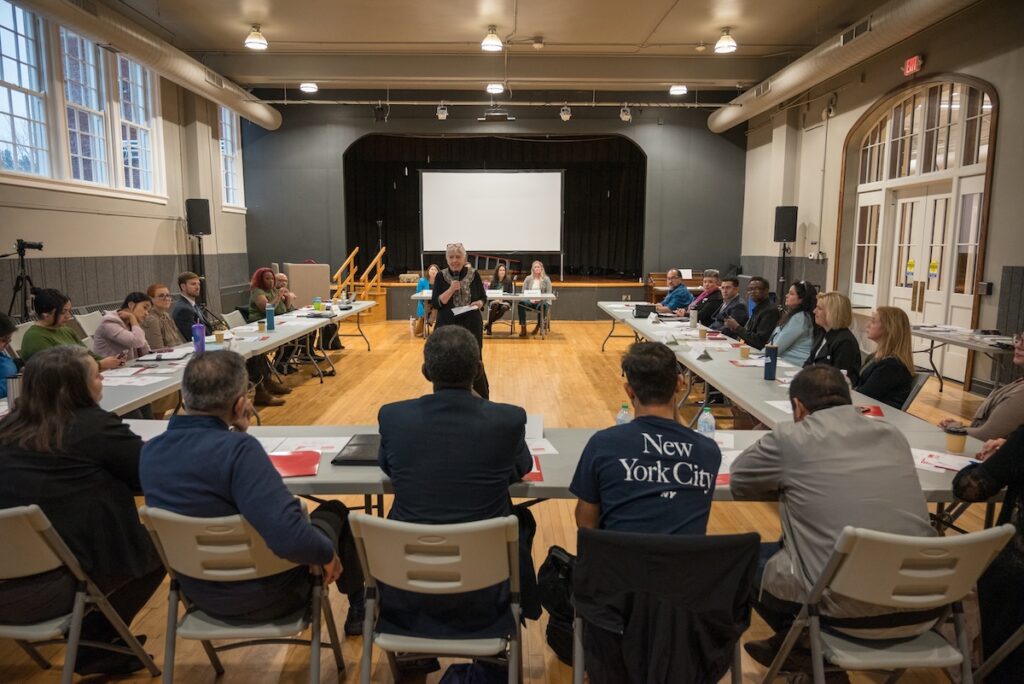OMAHA, Neb. – Not long after moving to New York, Sharfat Ray fell prey to an online scam that cost him his entire savings. Undaunted, the former translator for US armed forces in Afghanistan used the experience to become an advocate for others in his community.
Ray, who now lives in Omaha, shared his story during an Oct. 30 convening of experts from the Federal Trade Commission (FTC), members of the press and community stakeholders.
“It impacted me in a really bad way,” said Ray, 35. “I was new (to the country). I had a little bit of savings. I lost everything. It was bad.”
According to Ray, like other Afghans who had experience as translators with the US military, he began looking for work that aligned with his skills. Someone found him via his LinkedIn profile and shortly after he signed a contract.
“There weren’t a lot of interviews, though,” he recalled. “It was too good to be true.”

After a week or so of work, Ray received a check for $3500, more than double what he expected. He then got a call from his alleged employers letting him know he’d been overpaid, directing him to deposit the check in his account and send the difference back to them, which he did.
The original check, it turned out, was fraudulent, meaning Ray was out both his salary and whatever he had saved in his account.
Scams and crypto ATMs
According to the FTC, there were 9,337 reports of fraud across Nebraska in 2023, with losses totaling $25.2 million. The most common type of fraud involved imposter scams, where criminals pretend to be a trusted entity — often law enforcement, a government agency, or a financial institution — demanding payment, typically involving either gift cards or, increasingly, crypto currency.
Aimee Molten represents District 7 on the Omaha City Council. In mid-October, she succeeded in passing an ordinance requiring business owners to place warning signs on crypto ATM machines that alert consumers to the risk of fraud.
“There has been a huge uptick in scammers that are telling people to use the crypto machines that are popping up all over our state and city,” she said, including in established businesses like Walgreens, large supermarket chains and hotels.
“The majority of these machines are being used for criminal behavior,” she said, including sex trafficking and drug sales.
Molten described how victims will often get a call from someone pretending to be with local law enforcement, warning them of a pending warrant because of a missed jury duty assignment. The scammers will then demand that payment in amounts ranging from $3,000 to $6,000 be made at one of these machines.
Over 100 such cases have occurred in the past year, said Molten.
“Anyone who has one of these ATMs,” she explained, “has to post a notice on the machine or above the machine. On one side it has a sheriff’s badge and on the other an Omaha police shield. And it says no law enforcement agency will ever have you post money into a crypto currency machine.”
Under the ordinance, businesses that fail to comply face fines of up to $500. Molten says she wants to take the ordinance statewide.
“Not only do I want education” around scams. “I want a little enforcement behind it,” she said.
Links to sex, labor trafficking

Enforcement is what brought Bebe Strnad to Omaha.
A California native, Strnad spent years developing an enforcement model targeting scammers for the law firm where she worked in the Bay Area. Nebraska’s Attorney General, Mike Hilgers took notice and last year invited Strnad to take the lead as chief of the state’s Consumer Protection Bureau.
“We’re focused on protecting Nebraskans from similar types of scams and fraud… things that affect their day to day,” said Strnad, who remained vague on the details of her strategy, noting scammers “follow the news” and take cues from what they read and hear as they evolve their schemes.
“Omaha is a huge target for scammers,” she said, explaining that criminals “know there is money here. They also know there are a lot of people here who, if you hit them, won’t have a lot of resources to fight back.”
Among those being hit are small family farmers, as well as small-to-medium sized businesses, elders and immigrant communities where English is limited.
Strnad also highlighted the link between financial scams, on the one hand, and sex and labor trafficking on the other.
“A lot of victims of both labor and sex trafficking… get tricked into what they think is a job or a certain living situation and actually turns out to be a trafficking situation,” she noted. “That is something we are very much looking into.”
In April, Nebraska’s state legislature passed a law, LB934, requiring that online platforms take down content involving sexual assault of any kind. According to Strnad, unhoused women are among the primary targets of this kind of content.
Targeting the most vulnerable

Tamara Dwyer is Omaha’s Homeless Services Coordinator.
“I recently worked with a young woman in a shelter who paid some amount of money she saved up for a deposit on a place. She lost the money because it wasn’t a real rental,” Dwyer recounted.
Estimates suggest the homeless population in the Omaha-Council Bluffs region has spiked by as much as 150% in recent years, with anywhere from 1,700 to 1,900 people currently unsheltered.
Other scams targeting the poor and unhoused include Section 8 housing applications, which Dwyer says are proliferating of late, even as Omaha’s housing market grows increasingly more costly. Fake sites promise consumers housing vouchers in exchange for personal information.
Purba Mukerjee, an attorney with the FTC’s Midwest division, shared how the agency in February won a $195 million judgement against the website Simple Health Plans, which offered consumers sham health care plans that left them uninsured.
“We shut them down,” said Mukerjee, noting how consumer reporting played an instrumental role in the case.
“The FTC is good with the resources we have,” Mukerjee’s colleague at the FTC, Kati Daffan, assured attendees. “But the size of the challenge is staggering.”
An ‘eye opening experience’
Ray, now a father of four, including one son, Adil, who is severely disabled, describes what happened to him in New York as an “eye opening experience.” He began researching online scams, and eventually enrolled in a cyber security degree program.
“I am advocating for this,” he said, adding that even with everything he’s learned, “We’re still vulnerable.”
Two months ago, Ray got a call from the Omaha Public Power District warning that his payments were overdue and that his power would be shut off unless he paid via Walmart gift card. Groggy, Ray jumped up and began to get dressed. That’s when he realized that his payments were current and that he had, once again, been targeted.
“It happens. There are times when your mind is not in that state,” he said. If that happens, “Just get the info, call the official agency back, or try to consult with someone that you trust before doing something.”
If you or someone you know is the victim of a scam, report it to reportfraud.ftc.gov. The site is available in multiple languages. The FTC also has translators available for those with limited English proficiency.




